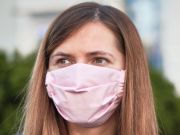- Are You Making This Expensive Thermostat Error This Winter?
- Recognizing the Signs of Hypothyroidism
- 10 Strategies to Overcome Insomnia
- Could Artificial Sweeteners Be Aging the Brain Faster?
- Techniques for Soothing Your Nervous System
- Does the Water in Your House Smell Funny? Here’s Why
- Can a Daily Dose of Apple Cider Vinegar Actually Aid Weight Loss?
- 6 Health Beverages That Can Actually Spike Your Blood Sugar
- Treatment Options for Social Anxiety Disorder
- Understanding the Connection Between Anxiety and Depression
Wearing a Mask Doesn’t Cause CO2 Poisoning

Wearing a face mask cannot lead to carbon dioxide poisoning, even in people with lung disease, researchers report.
The findings counter claims that wearing face masks to prevent spread of the new coronavirus may put some people’s health at risk.
The authors of the new study assessed changes in oxygen or carbon dioxide levels in healthy people as well as in those with chronic obstructive pulmonary disease (COPD), before and while using surgical masks.
In general, people with COPD must “work harder to breathe,” which can lead to shortness of breath and/or a tired feeling, according to the American Thoracic Society.
The study — published online Oct. 2 in the Annals of the American Thoracic Society — found “that the effects [of wearing masks] are minimal at most even in people with very severe lung impairment,” said lead author Dr. Michael Campos. He’s an associate professor in the University of Miami’s division of pulmonary, allergy, critical care and sleep medicine.
Campos also addressed the feeling of breathlessness that some healthy people may experience when wearing a mask.
“Dyspnea, the feeling of shortness of breath, felt with masks by some is not synonymous of alterations in gas exchange. It likely occurs from restriction of air flow with the mask in particular when higher ventilation is needed (on exertion),” he said in a society news release.
For example, if you’re walking briskly up a hill, you may experience breathlessness, and a mask that is too tight may increase that feeling. The solution: Slow down or remove the mask if you’re at a safe distance from other people, Campos advised.
“It is important to inform the public that the discomfort associated with mask use should not lead to unsubstantiated safety concerns as this may attenuate the application of a practice proven to improve public health,” the researchers concluded.
“The public should not believe that masks kill,” Campos emphasized.
More information
The U.S. Centers for Disease Control and Prevention has more on COVID-19.
Source: HealthDay
Copyright © 2026 HealthDay. All rights reserved.










